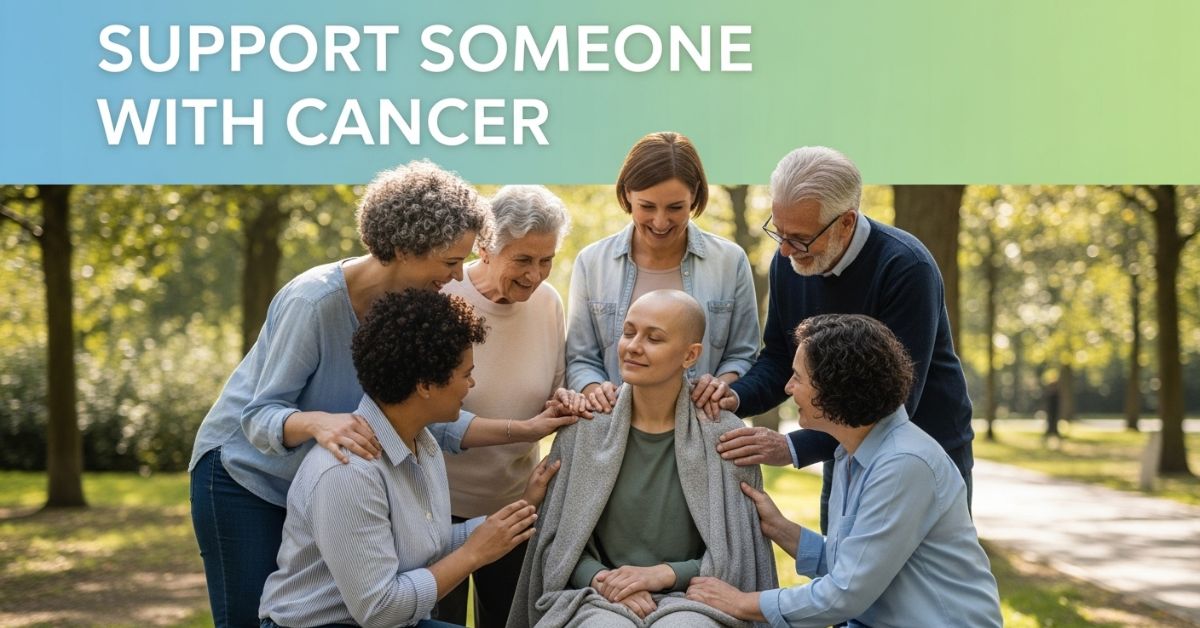When someone you love is diagnosed with cancer, it can be hard to know what to do. You may want to help but feel unsure where to start. Real care is not about finding perfect words or making big gestures. It comes from being present, showing patience, and offering steady help.
Learning how to support someone with cancer means giving comfort through simple and thoughtful actions. Listening, helping with everyday tasks, or spending quiet time together can make a real difference when life feels uncertain.
Understand What They’re Going Through
Each person’s experience with cancer is different. Some people stay positive and open, while others need more privacy. Fatigue, stress, and emotional ups and downs are common. The best thing you can do is to meet them where they are.
Avoid assuming how they feel or what they need. Let them share what they want to share. Listen without interrupting. Sometimes silence and presence help more than advice.
Many people mean well but end up offering empty phrases like “stay strong” or “you’ll be fine.” Instead, say something simple and honest like “I’m here for you.” That small sentence shows care without pressure.
Learn How to Help Someone Going Through Chemo

Chemotherapy can be exhausting, both physically and emotionally. Knowing how to help someone going through chemo starts with paying attention to their day-to-day needs. Offer to drive them to appointments, bring meals that are easy to digest, or keep them company during treatment if they want it.
Help with small tasks like grocery shopping or cleaning. Chemo often causes fatigue and taste changes, so meals should be simple and nutritious. Avoid strong smells and heavy spices.
If they don’t want company, that’s okay too. Sometimes just checking in with a short message saying, “Thinking of you today,” is enough.
Offer Practical Help Without Waiting to Be Asked
People going through treatment often hesitate to ask for help. It’s not because they don’t need it. Many just don’t want to burden others. This is why specific offers work better than general ones.
Instead of saying, “Let me know if you need anything,” try saying, “Can I bring dinner this week?” or “I’m heading to the store, can I grab anything for you?”
You can also help with chores, pay bills online, take care of kids or pets, or just keep their home tidy. These simple actions help them focus on healing.
Respect Their Space and Boundaries
People handle illness differently. Some want regular visits and conversations. Others need quiet time alone. Respect their choices without taking it personally.
Always ask before visiting. A short message like, “Is today a good time for a visit?” shows care and respect. If they say no, don’t push. They might be resting or just need a quiet day.
Supporting them also means understanding emotional space. Avoid asking too many personal medical questions unless they bring it up. Let them lead the conversation.
Be a Good Listener

Listening is one of the most powerful ways to help. When you listen fully, you give them a safe space to express fear, frustration, or hope. You don’t need to fix their problems or offer advice.
If they want to talk about treatment, listen. If they want to talk about something else, follow their lead. Sometimes they just want a normal chat about work, family, or a favorite show. Those moments of normal life can feel refreshing and grounding. If you’re wondering how to support a friend with cancer emotionally, start by listening more than you speak and respecting their need for quiet or space.
Help Keep Daily Life Running Smoothly
Little everyday chores can feel like too much to handle during treatment or recovery. Offer to handle household chores or errands.
Some examples include
- Cooking or bringing ready-to-eat meals.
- Helping with laundry or dishes.
- Paying bills or organizing paperwork.
- Taking care of children or pets.
- Driving them to medical visits.
Support the Caregiver Too
Caregivers are often the quiet heroes behind the scenes. They juggle medical appointments, emotional care, and their own responsibilities. Offering help to them is another way to support someone with cancer.
Always give them time to rest or break for a few hours. Bring them a meal or run errands so they can rest. A gentle message or a quick stroll together can sometimes help them refuel.
When caregivers feel supported, patients feel it too. It creates balance and relief for everyone involved.
Share Encouragement, But Stay Real
Encouragement should feel genuine, not forced. Simple words like “You’re doing great” or “You don’t have to face this alone” are enough. Avoid false positivity. A real connection means more than motivational phrases.
If you know people who have recovered from cancer, sharing gentle, uplifting Cancer survivor stories can bring hope. Just make sure the story is relevant and positive, not overwhelming.
Visit Thoughtfully and Bring Comfort
Visits can lift a person’s mood, but timing matters. Always check before you come by. Keep visits short unless they ask you to stay longer. Bring calm energy and avoid heavy conversations unless they bring them up.
If they are away from home for treatment, small familiar things help. You can bring cozy blankets, photos, or favorite snacks. Creating a comfortable space can make a hospital or recovery room feel warmer and more personal.
Offer Emotional Support and Stay in Touch

Even when treatment ends, recovery continues. Some people struggle with anxiety or fear of recurrence. Emotional support remains essential.
Keep checking in with small gestures. Send a message, a card, or a call just to ask how they’re doing. Let them know you still care.
If the cancer survivor needs counseling or encouragement, you can also connect them with support for cancer patients. Many survivors find comfort in talking to others who have faced similar challenges.
Help Them Find the Right Support Resources
There are many forms of support for cancer patients, from hospital programs to community networks. Some focus on emotional health, while others help with practical needs like transportation or nutrition.
If they seem unsure where to start, offer to research local programs or online groups. Just make sure any information you share comes from trusted medical or cancer-care organizations.
For people who have finished treatment, supporting cancer survivors means helping them rebuild life step by step. This could include attending follow-up visits, finding healthy routines, or joining survivor communities.
Continue Supporting Them After Treatment
Recovery doesn’t end when treatment does. Survivors may look fine but still deal with side effects or emotional weight. Keep offering small gestures of care.
Stay consistent with messages or visits. Encourage them to share how they’re feeling, but don’t force it. Help them celebrate progress, whether it’s walking further, eating better, or returning to work.
Long-term supporting cancer survivors involves patience, presence, and steady friendship. It’s about being part of their life as they rebuild confidence and strength.
Respect Independence and Privacy
If your loved ones are healed from cancer, may be they want to control over their lives again. Respect that and offer help, but don’t take over. Ask what they prefer. Some might want to handle things alone again, while others may still need support.
Encouraging independence shows trust. It reminds them they’re still in charge of their choices and future.
Encourage Gentle Movement and Healthy Habits
Physical activity can help rebuild energy, but only when approved by their doctor. Encourage slow, gentle movement. Even short walks or stretching can help improve circulation and mood.
You can share safe options like exercises for cancer patients that focus on breathing, flexibility, and light strength work. Always remind them to go at their own pace. The goal isn’t fitness, it’s healing.
Healthy habits like eating balanced meals, staying hydrated, and resting are just as important. Offer to join them in cooking healthy food or taking short walks together.
Closing Thoughts
To support someone with cancer means to stand beside them with understanding and consistency. You don’t have to fix everything or have the right words. What matters most is showing genuine care through simple actions. Listening, checking in, and offering practical help remind them they’re not alone. With steady compassion and patience, you can make their journey a little lighter and their days a little brighter.
For more guidance and uplifting insights, visit iSurviveCancer, a resource that shares stories, tools, and encouragement for survivors and those who care for them. Their thoughtful approach can help you offer even stronger support and hope.
FAQs
What’s the best way to support someone with cancer?
Be present, listen, and offer practical help like meals, errands, or rides to appointments.
What should I avoid saying to a cancer patient?
Avoid clichés or false positivity. Simple honesty and kindness mean more than trying to cheer them up.
How can I help someone going through chemotherapy?
Offer rides, bring easy meals, or keep them company if they want it. Respect their need for rest and quiet.
Is it okay to talk about normal things?
Yes. Talking about daily life helps them feel normal and connected beyond their illness.
How long should I keep offering help?
Keep checking in even after treatment ends. Recovery continues, and ongoing support matters most.






